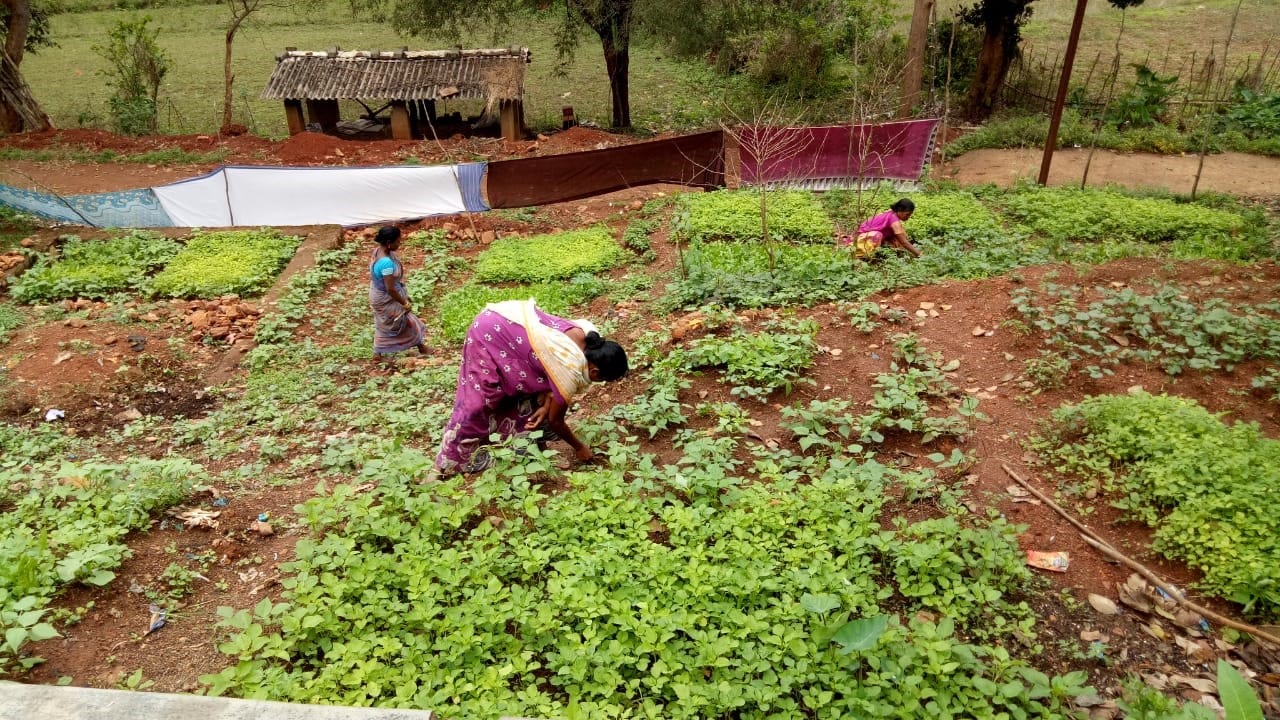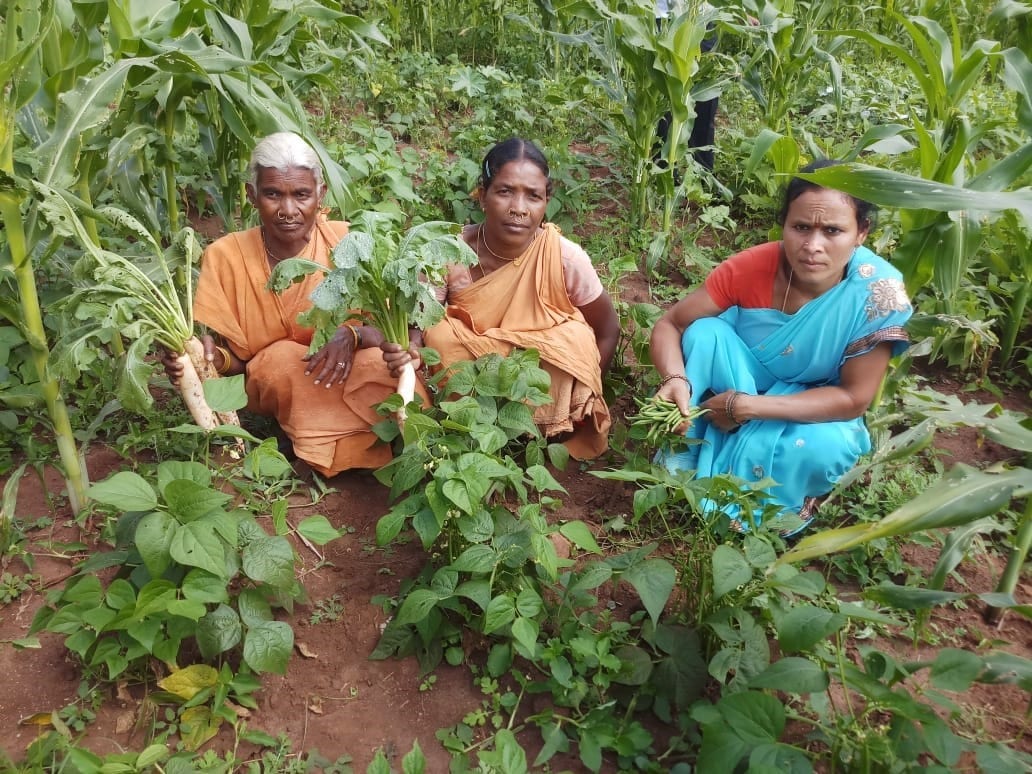A Coronavirus-Proof Solution to Food Insecurity: Organic Kitchen Gardens
One-fourth of the world’s undernourished people live in India, where the COVID-19 pandemic is only exacerbating the existing hunger crisis. In Andhra Pradesh, organic kitchen gardens are helping smallholder farmers like Mangamma save money and access healthy, nutritious food during this challenging time.

When N. Mangamma’s husband passed away a few years ago, she was suddenly left to care for her two young children on her own. Determined to find a way to support her family, she has been trying to make ends meet through small-scale farming and daily wage labor on other farms in her small community of Veesamamidi in Andhra Pradesh, India.
COVID-19: New Challenges
However, like many other smallholder farmers in India, Mangamma’s life has changed significantly since the beginning of the coronavirus crisis. With the number of active cases in India on the rise, the government’s country-wide lockdown to contain the virus has had more repercussions than one might imagine. The small-scale farmers of rural India not only experienced a loss in livelihoods due to the shutdown of wholesale agricultural markets, but the resultant disruptions in the supply chain and restrictions on movement also led to most of them being unable to access even basic commodities, such as vegetables and other groceries.
TechnoServe, with grant funding from Walmart Foundation, is working with local communities to address this challenge. Since 2019, TechnoServe has worked to improve the livelihoods of 17,000 smallholder farmers in Andhra Pradesh, India, through the Sustainable Livelihoods for Smallholder Farmers program. The project aims to improve the income of smallholder farmers by strengthening farmer producer organizations (FPOs) and transforming them into sustainable enterprises that link producers to stable, profitable markets for their crops. Much of this work applies a gender lens. For example, the program aims to increase women’s participation in and benefit from FPO membership and market access.
A complementary project intervention focuses on the promotion of organic kitchen gardens, which are managed primarily by women farmers. Using a gender-conscious approach, farmers learn to grow vegetables in their backyards. These gardens ensure additional food security for smallholder farming households while also empowering women by increasing their involvement in economic activities and generating additional income. Since the beginning of the pandemic, these kitchen gardens have become even more important.
“The lockdown is necessary right now and we go to the market only during absolute emergencies,” explains Mangamma. “Thankfully, I can depend on my kitchen garden to provide vegetables for the family. I can also save between $10.70 and $16.05 every month because I don’t need to purchase these vegetables from the market anymore.”
Not only has growing vegetables in her backyard helped Mangamma reduce her monthly expenses, but it has also led to an increase in her family’s consumption of nutritious, organic vegetables.
TechnoServe has organized training sessions, distributed seeds, and provided support to over 450 women farmers from 20 villages in the regions of Paderu and Chintapalli of Visakhapatnam district. A total of eight varieties of vegetable seeds have been distributed, including eggplant, tomato, green chilies, french beans, cowpea, radish, amaranth, and spinach. Most participants have already started harvesting their produce and use the vegetables from their kitchen gardens for everyday consumption.
Thankfully, I can depend on my kitchen garden to provide vegetables for the family. I can also save between $10.70 and $16.05 every month because I don’t need to purchase these vegetables from the market anymore.”
“The training was very helpful,” Mangamma shares. “I thought I knew how to sow vegetable seeds before the intervention, but somehow I was not usually successful, and the vegetables didn’t always grow well. The training has helped me understand the importance of sowing the seeds in a systematic manner. Look at how healthy my vegetables are now! I have already started harvesting spinach and amaranth and consume them regularly.”
Encouraging Engagement
One important aspect of the program is consistent engagement with farmers. Community resource people (CRPs) live in the communities and are trained by TechnoServe to provide support throughout the program. “Lakshmi keeps visiting regularly to check on my garden and ensure that the vegetables are growing well,” Mangamma says.

The use of CRPs has been especially helpful during the lockdown. While the rest of the project team has been unable to visit the farmers in person due to travel restrictions, the CRPs have been able to continue supporting farmers in their communities. They have been able to mobilize and support the farmers, connect them with the TechnoServe team virtually, and help solve problems in the field while following the social distancing measures prescribed by the government. The organic kitchen garden approach and use of CRPs can help farmers increase yields and production diversity. This approach can be especially helpful to farmers who rely on more annual cash crops or short-cycle crops, improving access to food and increasing resiliency.
Mangamma is one of the 22 women in her village who have taken part in TechnoServe’s kitchen garden training. Many other women who have seen Mangamma’s organic kitchen garden are now encouraged to set up their own gardens as well. Mangamma, as always, has been happy to help. While many of her fellow villagers are facing difficulties buying fresh vegetables — either due to the lack of access or lack of cash — Mangamma has been able to rely on her kitchen garden to provide fresh fruits and vegetables for her own family and for others in the community. “I usually harvest more than I need in one go, so I can distribute some of it to families in my village. The markets are far and given the restrictions, not a lot is available for sale even there.”




